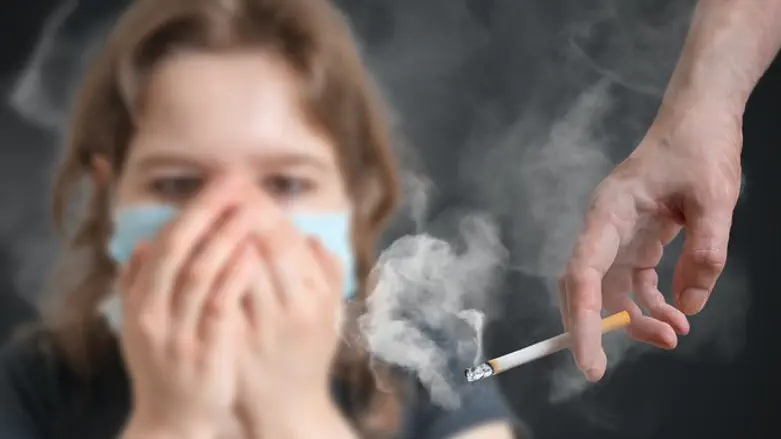
Despite pressure from both the left and right to tighten laws on smoking, Israel's Health Ministry has repeatedly refused to acknowledge the gravity of the issue.
A study published by BJM Journals in March 2017 showed high levels of nicotine on the hands and in the saliva of children who touch furniture in a room where someone previously smoked - even if the smoker had left the room.
Interestingly, in at least 80-90% of SIDS cases, at least one parent smokes. This parent does not need to smoke near the child - third-hand smoke (the smell left on clothing, furniture, hair, and skin) contains the same chemicals as first- and second-hand smoke.
Though smoking was on the decline in 2016, nearly 40% of Israelis are smokers by the time they finish their mandatory IDF service.
A proposal put forth by Meretz MK Tamar Zandberg in July last year would have banned anyone born after 2010 from purchasing cigarettes - even after they turn 18. New Zealand has already implemented a similar law, and Russia is considering it.
Zandberg's proposal received widespread support from both sides of the political spectrum, but seems to have been dropped. And in August 2017, Health Minister Yakov Litzman (UTJ) refused to back a similar bill which would raise the minimum age for smoking to 21, despite the fact that studies done in the US show that raising the minimum age for smoking reduces the number of young smokers by approximately 50%.
Meanwhile, Finance Minister Moshe Kahlon refused to raise the tax on rolling tobacco, saying it would "happen over his dead body" since he had "vowed not to raise taxes" and sees equalizing taxes on rolling tobacco and pre-prepared cigarettes as a "tax raise."
However, none of the proposed bills solve a widespread problem: Worldwide, the vast majority of smokers begin smoking before the age of 18. In Israel, 85% of smokers begin smoking before the age of 21.
If minors are receiving cigarettes from those over the age of 18, no new law will truly create a healthier, smoke-free younger generation. Or will it?
The only way to prevent children and teens from acquiring cigarettes is to severely punish those who give them the dangerous items. Currently, however, there is no way to track where youngsters receive their cigarettes from.
However, if the Knesset passed a law requiring all cigarettes, cigarette boxes, and rolling paper to carry a unique number, linked that number to the ID number of the adult purchasing the cigarettes, and made it illegal to be in possession of a cigarette without a number or with an illegal number, things might change very quickly.
This proposal would require each cigarette in a box to carry an identical number, marked both on the box and on each cigarette in it. "Rolling paper" would need to be printed with the numbers spaced 4-5 millimeters from each other, across the entire paper and on both of its sides.
Minors caught smoking would need to hand over the cigarette, whose number would be traced to the person who purchased it. If the purchaser is not the minor's parent, he or she would receive a fine of 3,000 NIS ($875) for a first offense, 5,000 NIS ($1459) for a second offense, and 8,000 NIS ($2334) plus two nights in jail for a third offense. These fines would not be allowed to be mitigated in court.
If the purchaser is the child's parent, the fines would be the same, but on the third offense, the family would be matched with a social worker from the Welfare Ministry.
Police officers and municipally-appointed supervisors would need to receive, across the board, the ability to approach and fine violators, and districts would be required to appoint "cigarette cops" who patrol both streets and business centers searching for violators. At least in the beginning, these supervisors would need to be required to fill a quota. This quota can be reduced as the number of violations drops.
Currently, Israeli law forbids smoking in certain places, but violators are only fined if a civilian reports the crime and if a supervisor arrives in time. Usually, by the time a supervisor arrives, the smoker is long gone, laughing to himself at both the law and the civilian who reported him.
To effectively reduce the number of smokers and the number of victims of second-hand smoke, enforcement must become proactive, not reactive.
The above proposal could work, and should receive the necessary support, but it will need to be aggressively pushed forward, and the Health Minister - who last year buried, indefinitely, the smoking report and claimed there were "professional doubts regarding the way the statistics were measured" - will need to cooperate.
